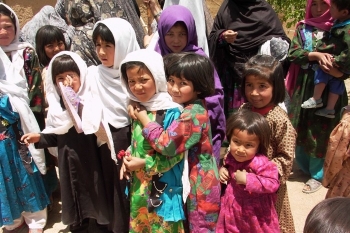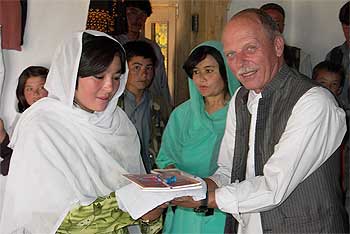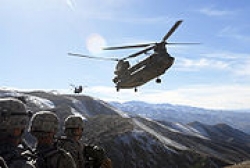Hundreds of thousands now face starvation as crops, soils washed away
Rescue Task Force seeks help to save lives of Afghan women & girls at literary schools
By Miriam Raftery
 August 19, 2010 (San Diego) –“The same floods that are hitting Pakistan are hitting Afghanistan. It’s just horrific,” said Gary Becks, founder of Rescue Task Force, a San Diego-based nonprofit that has its roots in East County.
August 19, 2010 (San Diego) –“The same floods that are hitting Pakistan are hitting Afghanistan. It’s just horrific,” said Gary Becks, founder of Rescue Task Force, a San Diego-based nonprofit that has its roots in East County.
Becks has led relief efforts in some of the worst disasters on earth including the Asian tsunami, Hurricane Katrina, major earthquakes, and the Cedar Fire. But the scale of devastation in Afghanistan goes far beyond even those catastrophes. Threats from the Taliban make relief efforts dangerous—and with farmlands washed away, the very survival of the Hazara people is at stake.
While most homes were on hilltops and did not suffer damage, farmlands have been ravaged by the flooding, Becks said in an exclusive interview with East County Magazine. “It’s not just the crops that are gone. The dirt is gone, scooped right down to the bedrock. They don’t have seed for the next planting—and they don’t have dirt to put the seeds in. We can’t help with that. It’s too big for us to do.”
Rescue Task Force volunteers are doing what they can. A coordinator has been using school funds to buy flour and oil. “We have some money and we’re trying to raise more—but we can’t feed hundreds of thousands of people,” said Beck. “We’re focusing our relief efforts where our schools are.”
Becks and his late partner, Wendell Cutting, started schools in Afghanistan out of their own pockets. “I had worked there in the 1980s during the Soviet occupation, made some dear friends with the Hazara people, the Mongols. They are very persecuted by the Taliban.” One reason for the persecution is because the Hazara in the province where RTF operates 21 schools allows women and girls freedoms that are forbidden by the Taliban.

“The girls don’t wear their veils. The village elders are very supportive of having education for their women…These people are so sweet, and they’ve had such a hard life,” said Becks, who asked that the province not be published for fear of antagonizing extremists who have been known to sabotage efforts in the past.
Asked if international aid groups may assist with air drops of food, Becks' voice turned grim. “Nobody will do food drops. The Hazara are in a land island. The Taliban is all around them…Getting to them is too hazardous,” he said, adding that he’s had to dye his hair black for protection when he’s visited RTF’s literacy schools.
RTF’s 21 schools currently have 800 students. Another 7,000 students have graduated from the literacy schools and 2500 of those have been enabled to attend other schools. In one school, three generations of Hazara women are attending classes.
“This is the answer to extremism: it’s basic education,” Becks said.
 Women in the schools have expressed gratitude for other reasons, such as being able to write down recipes and share with other family members.
Women in the schools have expressed gratitude for other reasons, such as being able to write down recipes and share with other family members.
An 18-year-old Afghan woman, quoted on RTF’s website, said the day she heard that her village had started a literacy center was “the best day of my life.”
An older woman wrote of her many daily chores, from caring for cattle to washing clothes, before the school was opened. “My life is completely repeated over everyday til this moment.”
Now, however, the focus is no longer on literacy, but survival.
Asked how many people are impacted by the flooding in the Afghan region, he replied, “There’s got to be 100,000 to 200,000. They are so isolated, and during the winter time there is no way to move in or out.”
Pakistan is already flooded with Afghan refugees. Asked what may happen to the Hazara people in Afghanistan, Becks replied, “They will have to leave, but they have no place to go.”
He holds out hope that perhaps a way will be found to terrace some hillsides, as has been done in the Philippines. But even that prospect is daunting. “IT’s like God was angry when he made this place,” said Becks, describing rugged terrain with some cliffs towering 16,000 feet high. Places so remote and inhospitable that not even the Russian army could conquer the people of Afghanistan.
One bright spot is that no students or teachers at RTF’s schools lost their lives in the floods. But without help, the people face slow death by starvation—if water-born diseases such as cholera don’t claim their lives first. “My wife has a team of women doctors ready to go in, if they could find a way there safely,” said Beck, noting that Afghan culture prohibits male doctors from examining female patients.
RTF’s coordinator on the ground in Afghanistan left the remote province for Kabul, typically at 15-20 hour drive, allowing for Taliban roadblocks. That was several days ago; he has not been heard from since.
Before leaving, he sent e-mails describing the bleak outlook. In one village, people have lost about 800,000 trees, most of the harvest this year and more than 150 cattle. A recent graduate lost her father, her harvest, and 4,000 trees in the flood. “God knows how to rescue that family from hunger,” the coordinator wrote. The school’s first literary teacher also lost 90% of her farm , trees, and harvest. “She has seven children,” the e-mail said, warning that if aid does not arrive, “the lives of her children will be in danger of death from starvation.
Lack of clean water is also a threat which may cause dysentery, cholera, or other diseases.
“Rescue Task Force hears the cries for help and we are responding,” RTF stated in a letter sent to supporters. “We have Afghan volunteers of many years on the ground in Afghanistan bringing aide and support at great peril from Taliban extremists.”
RTF seeks donations, which may be made at its website: www.rescuetaskforce.org, or mailed to Rescue Task Force at 864 North 2nd Street, #340, El Cajon, CA 92011.











Recent comments